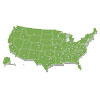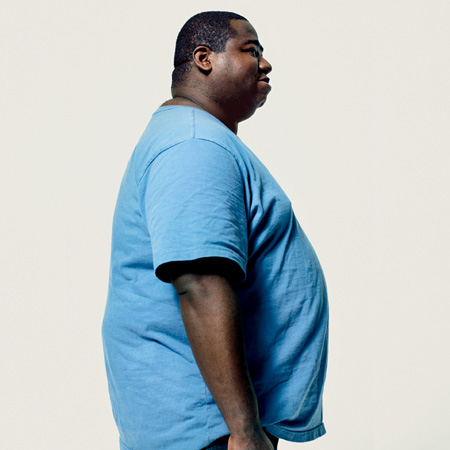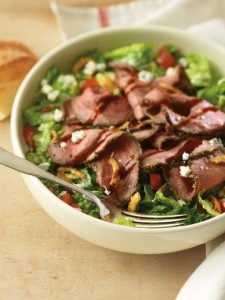Weight Loss: Fight Diet Cravings
The deprivation, the siren calls of beer and pizza, the annoyance of micromanagement. Worst of all is the sense that the diet will last forever, that the peppery tang of chicken wings will never again touch your lips. It's no surprise that 80 percent of diets go belly-up, according to the American Journal of Clinical Nutrition. We won't tell you to skip the diet altogether. We will tell you that it's going to be okay, though. In order to prevail, you simply have to get inside the diet's whens, hows, and whys. So this time, instead of stumbling blindly through treacherous territory, you're going to go on a guided tour of potential diet pitfalls--maybe the same ones that have snared you before. And this time, you'll breeze past them. There's just one catch: Pretty soon, you're going to need some new clothes.
1 Week
The crisis: You're freakin' starving.
Before: You ate the first thing you saw.
Now: Eat, but eat differently. Grab foods with lots of fiber and water. Your (gut) instinct says you want a Burger King Whopper with Cheese. Your smarter self knows that the same caloric load is found in a bowl of whole-wheat pasta with tomatoes and spinach, a whole-wheat dinner roll, a bowl of soup, and three scoops of sorbet. In the car? You'll keep a stash of dried fruit--a tasty, nutrient-rich hunger-killer.
The science: When your stomach is empty, the hormone ghrelin kicks in, which stimulates appetite, says Scott Isaacs, M.D., a clinical instructor of medicine at Emory University and author of Hormonal Balance. Don't let that happen. "By eating foods that are packed with fiber and water, such as fruits and vegetables, you'll feel full while controlling ghrelin production." Protein does the same thing, but some protein-rich foods are calorie-rich, too. So alternate. Have high-protein string cheese in the morning, fiber- and water-rich apple slices in the afternoon.
The 2nd crisis: You're cranky.
Before: You grabbed the chips and a soda.
Now: Boost your mood with snacks that satisfy your hormones, not your stomach. Fatty, sugary foods quickly turn into glucose after digestion. From now on, your snacks will be complex carbohydrates, such as a whole-grain treat like a bowl of Cheerios with blueberries and 2 percent milk.
The science: You're cranky because you've eliminated sources of quick mood-boosting energy--like chips and colas. "When these easy sources of energy are cut, you're going to go through a time when you don't feel great," says Vincent Pera, M.D., director of the weight-management program at Miriam Hospital in Providence, Rhode Island. Researchers in the Netherlands recently demonstrated that a glucose infusion can help ward off feelings of anxiety by enhancing serotonin function. That's fine, but get your boost from complex carbohydrates that raise your serotonin levels without inflating your waistline the way sugary carbs can.
Go on to the next page to read how to keep up your progress in the next month...
1 Month
The crisis: The scale seems stuck.
Before: You figured, What's the point? This isn't working.
Now: Get in gear. "Exercising is critical at this juncture," says Dr. Isaacs. Nothing complicated--just move. Cardiovascular exercise (running, biking, hoops) burns calories, and lifting weights increases muscle mass, which will make you burn calories even while you're sleeping. For each pound of muscle you add, you burn an extra 20 to 50 calories a day. And drink lots of water to replace what you're sweating out. Staying hydrated helps your body break down fat and deadens those hunger pangs. (After all, water takes up stomach space, too.)
The science: "As you lose weight, you require fewer calories, but by building muscle mass, you'll rev up your metabolism and counter this effect," Dr. Isaacs says. In a recent study at the University of Arkansas, people on low-fat, high-complex-carbohydrate diets who also exercised lost 3.5 pounds more over 12 weeks than those who ate similar diets but skipped the gym.
The 2nd crisis: You have intense food cravings.
Before: You gave in. Because, hey, life is meant to be enjoyed.
Now: Give in to snack attacks, but wisely. David Katz, M.D., director of the prevention research center at Yale University school of medicine and author of The Way to Eat, recommends carrying "the food equivalent of an umbrella." Keep a bag or small cooler of nuts, fruits, yogurt, and low-fat cheese on hand at all times. You need ready access to healthy sources of protein or fiber to offset sudden, out-of-nowhere cravings.
The science: "When you diet, your previously overstuffed fat cells start shrinking," Dr. Katz says. They know their number's up and that they'll soon be burned for fuel. Understandably, they have other plans. "These cells send a message to your brain saying that they need more fuel. They shut down production of leptin, the hormone that tells your brain you're satisfied," he says. So your brain, by way of your cells, goes on the hunt for anything it can get your hands on. Which is why you should keep healthy snacks within easy reach.
6 Months
The crisis: You've made so much progress that you think, What the hell.
Before: You slipped--face-first, into a double-pepperoni, extra-cheese pizza.
Now: Weigh in. You need to keep your eye on your rate of weight loss. Setting targets blows away complacency. "People taste success, and their adherence slips," Dr. Pera says. "Their initial feelings of urgency to lose the weight also diminish."
The science: A study at the University of Massachusetts at Dartmouth shows that people who weigh themselves regularly are more likely to stay focused. They're continually reminded of their success so far and of the road ahead. Reaching your goal weight makes you more likely to keep the pounds off. A researcher at the University of Pennsylvania reports that patients who achieve their weight-loss goals are more psychologically satisfied. You're likely to stick with anything--a job, tennis practice--when you know it's paying off.
The 2nd crisis: You reach a plateau.
Before: You figure, Well, that's it. I've come far enough.
Now: Diet less, exercise more. It's probably going to be easier to exercise more frequently than to further restrict a diet that's become an ingrained habit. Throw in a few high-intensity days--an extralong run or bike ride--to boost the calorie deficit. If your exercise is mostly cardiovascular, devote more time to weight lifting.
The science: "Because your caloric needs have lessened, you need to burn off more in order to continue to see results," Dr. Pera says. "If you don't increase your amount of exercise or continue to cut calories, you plateau." The muscle from weight lifting, Dr. Katz says, will "increase resting energy expenditure. Then, when you return to more aerobics, you're taking more calorie-burning muscle with you, and you'll be bumped off the plateau."
Go on to the next page to find out how to handle your diet in 9 months to a year later...
9 Months
The crisis: A voice in your head says, I want my life back.
Before: You got fat again.
Now: Let loose--a little bit. "Being on a strict diet can drain you mentally, so there's a huge temptation to let things slide," says Dr. Katz. If you're meeting your goals, give yourself a break. "If you love ice cream, try a lower-fat version or a sorbet," suggests Howard M. Shapiro, M.D., author of Dr. Shapiro's Picture Perfect Weight Loss. "A pint of Ben & Jerry's Phish Food ice cream has 1,200 calories, while a pint of sorbet has only 300. You can still enjoy the taste, but you're not inflicting so much damage." The same logic applies with pizza, cake, beer, you name it. Savor a cold one, but make it an Amstel Light. Instead of the all-meat, extra-cheese pizza, top yours with chicken and green peppers.
The science: "By making your choices, you're empowered and in control, and won't feel the deprivation that might lead you to quit," Dr. Shapiro says. When you feel as if you've cultivated enough willpower, reintroduce a couple of all-time favorites into your diet--as treats, not everyday fare. If you've made it this far, you deserve a Guinness and an order of chicken wings. The baked ones, thanks.
1 Year
The crisis: There is none.
Now: "Physiologically, you've converted your body from a foe to an ally," says Dr. Katz. Blur the line between diet and lifestyle. Now that healthier eating patterns are ingrained, your diet isn't a "diet" any longer--it's a new way of living.
The science: According to research by the North American Association for the Study of Obesity, successful dieters report that "significantly less" effort is required to maintain weight loss; as the pounds come off, less conscious attention is needed to keep them off. In other words, the longer you go, the easier it gets.
-
10 Easy Ways to Lose Weight
You can stage a coup on calories without ruining your life or eating a
-
Do Any Diet Pills Actually Work?
It’s normally safe to assume that any pill promising weight loss
-
Diet Strategies: Weight Loss Shakes
Shake that Extra WeightA study recently published in the Journal of Nu
-
Diet Strategies: Gluten and Weight Loss
If your belly wont budge, you may have a gluten intolerance. New Zeala
-
Dark Chocolate Health Benefits
With Valentine’s Day just around the corner, love is in the air… And s
-
Is Your Thyroid Making You Fat?
I’ve got a funny … and sad story to tell you today. We were flying hom




